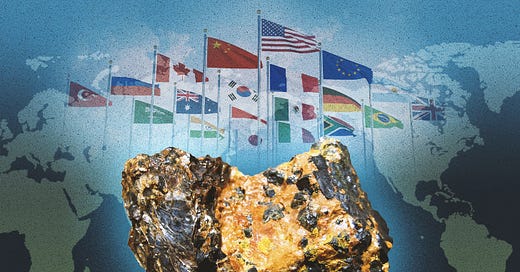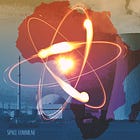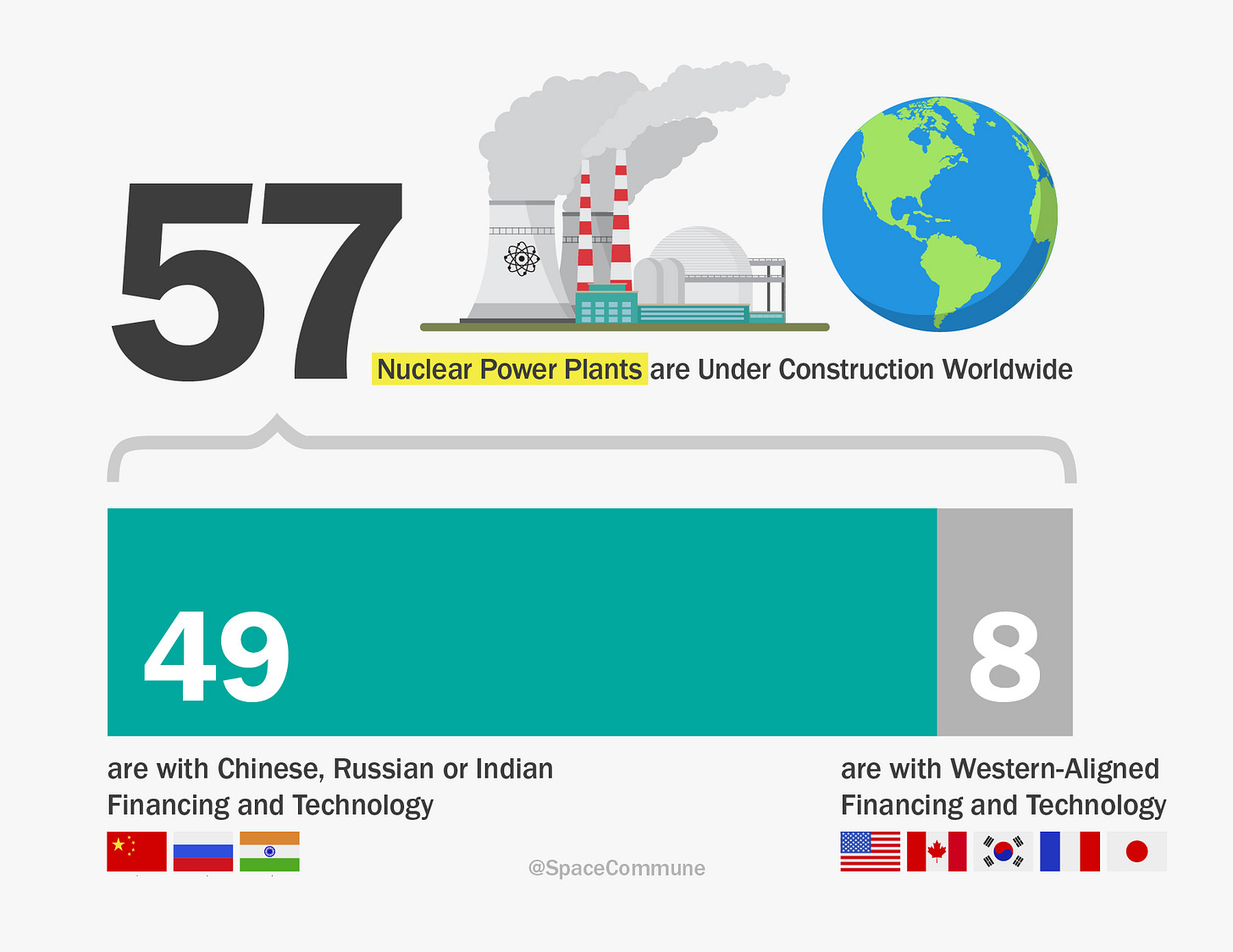Geopolitics Proving That Renewables are for Show, Nuclear is for Dough
How Nuclear Power Development and Uranium Are Becoming the Building Blocks of a Sovereign Nation-State
In a post-COVID, post-Ukraine-Russian SMO, post-Nordstream bombing, post-unipolar world, nuclear power is becoming a critical building block of the sovereign nation-state.
One would assume that in the era of the Green New Deal, the massive government incentives for solar, wind and battery technology would’ve caused a run in the markets for precious metals like lithium, copper, zinc, cobalt and nickel. After all, the International Energy Agency has repeatedly warned that there are not enough operating mines to build the renewables that could “prevent global warming from going above the 1.5C threshold,” while the G7 bloc of nations have committed over $600B in clean energy initiatives to “move beyond nationalist narratives.”
Additionally, as dedollarization proceeds via the BRICS and OPEC nations and geopolitical tensions mount, supply chains for fossil fuels are getting tighter and tighter. The clarion call of environmentalists and renewables advocates, ever since the Arab oil embargo of 1973, has been that investment in renewable energy was the “resiliency” answer to protect the West from energy supply shocks and having to drill our own oil (which is happening now more than ever).
Nuclear energy was supposed to be too dangerous, too expensive, and take too long to help anyone.
But something else happened. The Wall Street Journal says that “Green investors were crushed” and that the “ESG craze is fading.” The short and long-term prospects for uranium and nuclear fuel have ballooned.
“We’ve seen a very harsh reality check,” said Sonja Laud, chief investment officer of L&G Investment Management.
Spot prices for uranium have recovered not just to pre-Fukushima levels, but to 15 year highs not seen since 2007, pre-financial crash.
The Anti-Nuclear Open Society
If you’re a longtime Space Commune follower, you know many of the historical currents that set these trends into motion.
Going back to the Small is Beautiful revolution of the 1970s, oligarchs have fueled anti-nuclear hysteria at home and abroad not because they’re really concerned about radiation, but because nuclear power supports growing the potential of humanity, and helps create conditions for national sovereignty that could threaten the established world order.
Three Examples Include:
Green New Deal architect Senator Ed Markey (D-Mass) villainously prevented nuclear fuel from being shipped to India, a setback that kept hundreds of millions people in the literal dark for decades.
Robert F. Kennedy Jr. was dispatched to Cuba to wickedly prevent them from working with Russia to build nuclear reactors.
The Ford Foundation deviously funded activists to short-circuit a nuclear power deal between South Africa and Russia.
To help justify their strangling of development in other countries, the West also had to sabotage nuclear power in its own countries, leaning on hysterical true believer environmentalists to prematurely shut down or block nuclear plants like Indian Point in New York and Vermont Yankee, or to force operators to defer maintenance via austerity, causing frequent shutdowns and shortages.
BRICS+ Leads the Way (As Usual)
The two countries that didn’t blink were China and Russia.
Of 57 nuclear power plants actively in construction in 15 countries around the world, 49 are with state-owned Russian or Chinese companies. Only eight are using G7 technology and financing. In their own countries alone, China has an additional 197 nuclear reactors ($440B worth) either planned or proposed; Russia an additional 46. Of the remaining 187 proposed or planned reactors worldwide, most are going to be built by either Chinese or Russian state-owned companies.
In 2016, Rosatom spokesperson Kirill Komarov explained that Russia's gross domestic product gains three roubles for every one invested in building a nuclear power plant in the country, and two roubles for units built abroad:
"Our calculations speak for themselves: the construction of nuclear power plants in Russia with the national localization of production rate of 95-98% creates an additional seven to ten jobs in other industries […], boosting the socio-economic development of the country as a whole," Komarov said. "At the same time, when we build nuclear power plants abroad, Russian companies account for 60-70% of the work."
The construction of nuclear power plants abroad also "creates long-term economic ties.
"Modern nuclear power plants under construction have a planned service life of 60 years… we will have the opportunity to offer our products and services not only in the construction phase, but also during the plant's entire operation… includ[ing] fuel, services, staff training, repairs and modernization work." This "benefits the state" in creating jobs, orders for industry and taxes, thus "multiplying" the state's return on an investment in a project.”
Meanwhile, the world watched as Germany’s Energywiede plan to switch off their nuclear plants and spurn Russian gas resulted in the humiliating destruction of their industrial base and a stunning decision to begin burning coal, wood and dung to survive through the winter. As the Mike Tyson saying goes, everyone has a plan until they get punched in the mouth; for Germany, they had a plan until the dunkelflaute came.
Dunkelflaute is the German word for their frequent windless periods that can last weeks.
A Stunning COP28 Reversal
The big news in the world of nuclear power this week was that 22 countries, almost all closely aligned with the G7, declared their intention to triple global nuclear energy capacity by 2050 in the name of Net Zero. This move follows the trend of leading liberal Western environmentalist figures, some of whom built their careers on bashing nuclear energy, turning around and championing it.
The Real Reason Why U2 & AOC Flipped On Anti-Nuke Advocacy
Nuclear power is a technology for humanity where a massive amount of energy can be created from a miniscule amount of fuel. It’s been one of the most hotly debated topics in Western politics for decades. Some of the world’s most famous celebrities and politicians have burnished their credentials as environmentalists by railing against nuclear power.
It’s not because their baseless concerns about nuclear waste, safety or affordability were suddenly addressed. It’s not because the perfect ecomodernist manifesto or Tik Tok video was produced. And it’s not just because nuclear is a perfect emissionless energy provider for the Net Zero smart grids, AI data centers, livestreaming servers and cryptocurrency microtransactions that make up the Western economy of the future.
It’s because Western geopolitical strategy is reluctantly switching from a system of control, which wasn’t working, to a system of competition. Notably, the COP28 pledge was not signed by China or Russia, the two countries that are actually building the lion’s share of nuclear plants around the world.
That’s why understanding what happened with South Africa’s energy grid is so important.
For decades, G7 countries have used soft power to sabotage what infrastructure Global South countries have and to keep them developing too quickly. They then used the poison pill of renewable energy financing (via funds with names like Build Back Better World or Just Transition) to give them unreliable solar panels and wind turbines that can’t power factories and can’t last longer than 10-15 years; all in the name of “moving past nationalist agendas.” After all, countries that are built on soft renewable energy are not just dependent on the weather; they’re dependent on globalism.
China and Russia have been working with these same developing countries to build nuclear plants and other infrastructure that can support industry, energy security and sovereignty. While it’s true that nuclear energy is cleaner than other forms of energy, the primary benefits are that it can run 24/7, and a whole year of nuclear fuel for one plant can be safely transported in a single box truck and stored for long periods of time; meaning that nations can have energy security even if they stand up for themselves against hegemony. It creates entire constituencies and competencies that revolve around science, engineering and math. That makes nuclear energy “nationalist.”
Even though renewable energy is “so cheap” while prices for uranium climb sky-high, nuclear energy will continue to flourish throughout the world, and with it, the ability of humanity to flourish and raise its collective potential. We can only hope that the current state of competition between the G7 and BRICS nations will progress into a state of collaboration.












